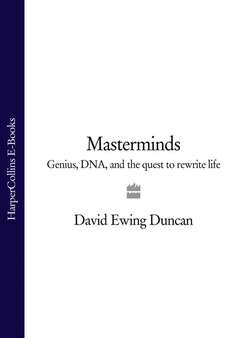Читать книгу Masterminds: Genius, DNA, and the Quest to Rewrite Life - David Duncan Ewing - Страница 14
2 EVE Cynthia Kenyon
ОглавлениеIn principle, if you understood the mechanisms
of keeping things repaired, you could keep
things going indefinitely.
—Cynthia Kenyon
Cynthia Kenyon wants to live to be one hundred and fifty years old, if she’s young and engaged in life. “Who wouldn’t?” She asks in a breathless whisper, telling me that humans might be able to live a very long time, if not forever.
Kenyon’s long, angular face is framed by straight blond hair parted in the middle. She talks excitedly, waving long, graceful fingers as her words spill out almost too fast to follow about how her lab at the University of California at San Francisco (UCSF) has increased the life span of tiny worms called Caenorhabditis elegans an average of six times normal by suppressing a single gene. This regulator gene, she tells me, in combination with other genes appears to control an entire symphony of genes that direct aging not only in worms, but in similar genetic pathways in flies, mice, and, possibly, humans.
This is the equivalent of people living for four hundred years, she says, adding that there is more good news coming from her millimeter-long lab animal of choice. Our worms stay young for most of these extended life spans, she says.
“You mean this is a Fountain of Youth gene?”
She nods, delighted that I have made this connection. Yet I don’t know what to make of a woman who has just told me that I or my children might live into the twenty-fourth century. I remember a mid-seventeenth-century poem written by Andrew Marvell about growing old, “To His Coy Mistress”:
But at my back I always hear,
Time’s winged chariot hurrying near;
And yonder all before us lie
Deserts of vast eternity.
Thy beauty shall be no more found,
Nor, in thy marble vault, shall sound
My echoing song: then worms shall try
That long preserved virginity.
This is the poet’s attempt to persuade his lover to make up her mind about having sex with him, because life is short, and they both might grow old and die at the rate she is going. But what if life weren’t short? What if what works on Kenyon’s worms really will work in humans?
One outcome would be that a modern-day coy woman would be able to put off her would-be lover for decades, or even centuries—and would require a rewriting of Marvell’s lines to something like this:
Take your time, my coy lass,
Time’s winged chariot won’t pass,
For three or four hundred years, if ever.
